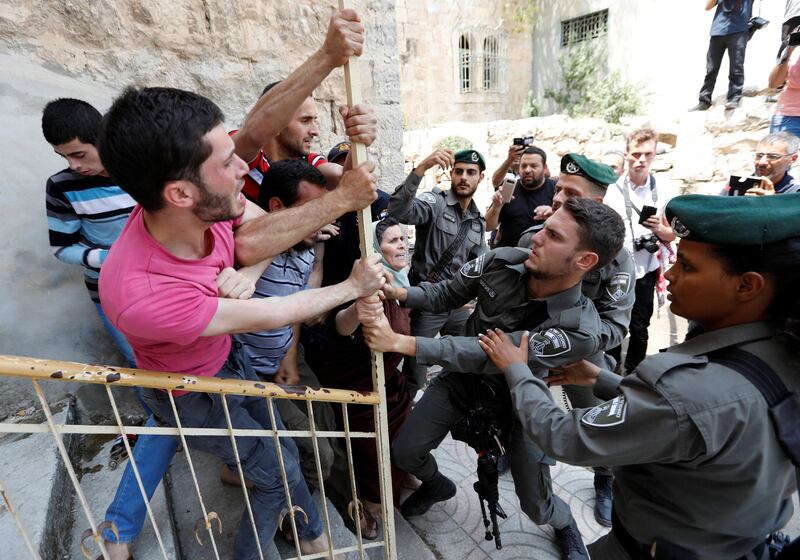Israel and Muslims continued their standoff at the Haram Al Sharif in Jerusalem on Wednesday with concerns of major violence this week if no resolution is found.
Muslims refused to enter the site and prayed in the streets outside for more than a week after Israel installed security measures at the compound.
Those followed an attack in which two policemen, and included metal detectors at entrances. Palestinians regard the move as Israel asserting further control over the site, which houses the revered Al Aqsa mosque and the Dome of the Rock.
Israel said the metal detectors were needed because the July 14 attackers smuggled guns into the site and emerged from it to attack the officers.
Protests and deadly unrest have erupted in the days since, with clashes breaking out around the compound in Jerusalem's Old City and in the occupied West Bank, killing five Palestinians.
A Palestinian also broke into a home in a Jewish settlement in the West Bank last week and stabbed four Israelis, killing three.
There are concerns that Friday's main weekly Muslim prayers - which typically draw thousands to Al Aqsa - will lead to serious clashes between protesters and Israeli security forces.
Following intensive international diplomacy and warnings of the potential of wider unrest, Israel removed the metal detectors early on Tuesday.
Cameras installed after the attack on the police were also removed.
But Israeli officials said they were to be replaced with "advanced technologies" - widely believed to be smart cameras with facial recognition technology.
Railings installed at the site's entrance before the metal detectors were removed have also remained in place.
The railings and suspicions over what new measures Israel is planning have led Palestinian and Muslim leaders to continue to call for a boycott of the site, and worshippers have heeded their call.
"We leave at 6am and we return after the last prayers around 9 to 10pm," Umm Maath, from Nazareth in northern Israel who has been coming with a group to pray outside in protest, said on Wednesday.
"We reject the metal detectors. We reject the cameras."
Palestinian president Mahmud Abbas, who announced a freeze on contacts with Israel last week over the dispute, said on Tuesday the suspension would continue until the site was returned to the way it was before the crisis began.
Turkish President Recep Tayyip Erdogan, who has spoken out strongly against the new security measures, welcomed Israel's removal of the metal detectors but said it was "not enough".
Israel struck back harshly, saying in a foreign ministry statement that "it's absurd that the Turkish government, which occupies northern Cyprus, brutally represses the Kurdish minority and jails journalists, lectures Israel, the only true democracy in the region".
A Palestinian distributes food donated to support demonstrators who have kept vigil for over a week as they pray outside Al-Aqsa mosque compound, also known as the Haram al-Sharif compound to Muslims and as the Temple Mount to Jews, in the old city of Jerusalem on July 26, 2017.
* Agencies





